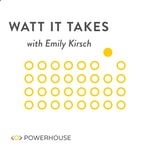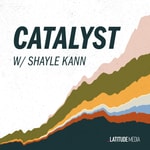Watt It Takes – Détails, épisodes et analyse
Détails du podcast
Informations techniques et générales issues du flux RSS du podcast.

Watt It Takes
Emily Kirsch
Fréquence : 1 épisode/33j. Total Éps: 85

Classements récents
Dernières positions dans les classements Apple Podcasts et Spotify.
Apple Podcasts
🇬🇧 Grande Bretagne - entrepreneurship
07/05/2025#69🇩🇪 Allemagne - entrepreneurship
07/03/2025#79🇩🇪 Allemagne - entrepreneurship
19/09/2024#84
Spotify
Aucun classement récent disponible
Liens partagés entre épisodes et podcasts
Liens présents dans les descriptions d'épisodes et autres podcasts les utilisant également.
See all- https://www.powerhouse.fund/
87 partages
- https://www.aes.com/
20 partages
Qualité et score du flux RSS
Évaluation technique de la qualité et de la structure du flux RSS.
See allScore global : 63%
Historique des publications
Répartition mensuelle des publications d'épisodes au fil des années.
AMP Founder and CEO Matanya Horowitz
Épisode 80
jeudi 12 septembre 2024 • Durée 01:07:55
Humans produce a lot of trash. How much trash you ask? We produce 2.3 billion tons of trash per year. That’s enough to fill about 800,000 Olympic pools every year. So, what do we do with it all and how does it get managed? Some of it, depending on your municipality, can be composted, some of it gets recycled, but despite our best intentions, most of it ends up in our landfills. In an ideal world, the majority of our trash would be reused and recycled, but recycling, despite its promises, is actually a regressing industry. Counterintuitively, over the last 15 years, recycling rates in the United States have stagnated and even decreased.
Recycling isn’t stagnating because people don’t want to recycle. In fact, people want to recycle so badly, waste management streams suffer from “wishcycling”, a phenomenon whereby people try to recycle items that not only aren’t recyclable, but actually end up contaminating and ruining potential batches of recyclables.
At the heart of it, recycling and waste management systems as they exist today face a major incentive problem. Because recycled material is sold in a commodity market, prices for recycled materials like aluminum, paper, plastic, and glass fluctuate a lot. An unreliable market disincentivizes the waste management industry from investing in more efficient sorting systems that could increase overall recycling.
While it might not seem obvious, recycling has an important role to play in global decarbonization. When materials like aluminum and plastic get recycled, the extraction of new raw materials to replace them is averted, as are the emissions that would have gone into their production. For example, for every ton of aluminum that gets reused, the carbon that would’ve been emitted into the atmosphere to produce more aluminum from new raw materials is never emitted.
As it stands, society is not capturing the decarbonization potential of recycling. Too much waste is wasted because of human error, a lack of incentives, and waste management systems with inefficient infrastructure. What if AI could revolutionize the way we manage our trash? Instead of exposing human lives to toxic chemicals and other dangers that inevitably find themselves in trash, what if there were technological interventions that could automate sorting, have an outsized climate impact, and make waste assets more valuable all at the same time? Our guest this month, Matanya Horowitz, CEO and founder of AMP, believes all of this is possible.
*note: In the episode, Emily incorrectly says that AMP has recycled 20 million metric tons of material. The actual number is 2.5 million tons.
Sponsors
Watt It Takes is brought to you by Microsoft.
The $1 Billion Microsoft Climate Innovation Fund is investing in innovative technologies that have the potential for meaningful, measurable climate impact by 2030. To date, Microsoft has allocated more than $700M into a global portfolio of over 50 investments including sustainable solutions in energy, industrial, and natural systems. Visit https://www.microsoft.com/en-us/corporate-responsibility/ to learn more about Microsoft’s progress toward their impact commitments.
This episode is also brought to you by JP Morgan.
J.P. Morgan is proud to serve companies that are advancing decarbonization across the globe through innovative business and technology solutions. With J.P. Morgan’s unmatched investment capacity, strong support model, and global scale, the Green Economy Banking team delivers the full suite of the firm’s financial products and advisory services to help fuel the growth of green businesses and the industry at large. No matter what stage you're in, you can rely on JP Morgan's expertise and connections to back your boldest pursuits. So take the right risks, while banking with confidence. J.P. Morgan: Let’s build your future together.
About Powerhouse and Powerhouse Ventures
Powerhouse is an innovation firm that works with leading global corporations and investors to help them find, partner with, invest in, and acquire the most innovative startups in clean energy, mobility, and climate.
Powerhouse Ventures backs seed-stage startups building innovative software to rapidly decarbonize our global energy and mobility systems. You can learn more at powerhouse.fund, and you can subscribe to our newsletter at powerhouse.fund/subscribe.
To hear more stories of founders building our climate positive future, hit the “subscribe” button and leave us a review.
Amperon Co-Founder and CEO Sean Kelly
Épisode 79
mardi 20 août 2024 • Durée 59:41
Extreme weather events are becoming more and more common. In July, Hurricane Beryl wreaked havoc on the Gulf Coast, causing 3 million Texans to lose power in the midst of a soaring heat wave, which killed 23 people.
Critics have raised questions about Houston’s power providers preparedness for a disaster like Beryl, and have raised concerns about the long delay in restoring power at a time where access to AC and power could have saved lives.
Ever increasing extreme weather events like Beryl require utilities, retail electricity providers (REPs), independent power producers (IPPs), and other energy traders and suppliers to rapidly forecast and adjust supply in order to provide safe, reliable, and cost-effective electricity. Traditional electricity demand forecasts, which rely on sparse weather data, analog meter readings, and regression-based historical demand data, are insufficient in the face of such events.
In order to better respond to extreme weather events, and facilitate the energy transition, we need solutions that turn energy data into action and insights for power providers to prevent outages, provide reliable power, predict demand, and even provide carbon insights. And that is exactly what Sean Kelley, CEO and Co-Founder of Amperon, is building.
Sponsors
Watt It Takes is brought to you by Microsoft.
The $1 Billion Microsoft Climate Innovation Fund is investing in innovative technologies that have the potential for meaningful, measurable climate impact by 2030. To date, Microsoft has allocated more than $700M into a global portfolio of over 50 investments including sustainable solutions in energy, industrial, and natural systems. Visit https://www.microsoft.com/en-us/corporate-responsibility/ to learn more about Microsoft’s progress toward their impact commitments.
About Powerhouse and Powerhouse Ventures
Powerhouse is an innovation firm that works with leading global corporations and investors to help them find, partner with, invest in, and acquire the most innovative startups in clean energy, mobility, and climate.
Powerhouse Ventures backs seed-stage startups building innovative software to rapidly decarbonize our global energy and mobility systems. You can learn more at powerhouse.fund, and you can subscribe to our newsletter at powerhouse.fund/subscribe.
To hear more stories of founders building our climate positive future, hit the “subscribe” button and leave us a review.
Commonwealth Fusion Systems Co-Founder and CEO Bob Mumgaard
Épisode 70
mardi 31 octobre 2023 • Durée 01:01:56
According to researchers around the world, fusion could be a nearly waste-free, carbon-free, and all-geography answer to creating enough dispatchable power to get us through the energy transition. To achieve this, all components of a fusion power plant need to be built so that when fusion energy becomes a reality, we have the industry, infrastructure, and processes in place to distribute the power, and it has to be cost competitive. This is exactly what Bob Mumgaard, Co-Founder and CEO of Commonwealth Fusion Systems (CFS), is building.
Today, CFS has more than 600 employees, has raised $2B, and is executing on their plan to make the “holy grail” of fusion energy possible.
Guest host Lara Pierpoint sat down with Bob to learn more about his journey, the CFS story, and the work being advanced by his team.
Sponsors
Watt It Takes is brought to you by Shell Ventures and SPAN.
Shell Ventures specializes in unlocking deployment opportunities to help their portfolio companies scale, access customers and commercialize their solutions. Visit shell.com/ventures to learn more about how they can help your company reach the next level of growth.
SPAN are the makers of the award-winning SPAN Panel—a smart electrical panel that enhances how homeowners interact with their energy. Interested in advancing your career at one of the premier companies in Climate Technology or getting SPAN installed in your home? Visit www.span.io to learn more.
About Powerhouse and Powerhouse Ventures
Powerhouse is an innovation firm that works with leading global corporations and investors to help them find, partner with, invest in, and acquire the most innovative startups in clean energy, mobility, and climate.
Powerhouse Ventures backs seed-stage startups building innovative software to rapidly decarbonize our global energy and mobility systems. You can learn more at powerhouse.fund, and you can subscribe to our newsletter at powerhouse.fund/subscribe.
To hear more stories of founders building our carbon-free future, hit the “subscribe” button and leave us a review on Apple podcasts.
Petra Co-Founder and CEO Kim Abrams
Épisode 69
jeudi 31 août 2023 • Durée 01:00:32
Climate change-fuelled natural disasters and vulnerable transmission infrastructure have defined some of the worst natural disasters of the past decade, including the 2020 wildfires in California. It’s clearer than ever that in high-risk areas, above-ground transmission lines need to be dug underground to protect communities from fires and to ensure their access to electricity in the face of increasing natural disasters. And that’s exactly why this month’s Watt It Takes guest, Kim Abrams, founder and CEO of Petra, is building a trenchless digging platform to make undergrounding utilities easier and more cost-effective.
Today, Petra has 72 employees across multiple continents, has raised $45M, and is winning contracts to underground transmission in the US and Colombia.
Guest host Lara Pierpoint sat down with Kim to learn how they're enabling utility undergrounding, more about their trenchless technology making it all possible, and the story behind how she founded Petra.
Watt It Takes is brought to you by SPAN.
SPAN are the makers of the award-winning SPAN Panel—a smart electrical panel that enhances how homeowners interact with their energy. Interested in advancing your career at one of the premier companies in Climate Technology or getting SPAN installed in your home? Visit www.span.io to learn more.
Powerhouse is an innovation firm that works with leading global corporations to help them find, partner with, invest in, and acquire the most innovative startups in clean energy, mobility, and climate. Powerhouse Ventures backs seed-stage startups building innovative software to rapidly decarbonize our global energy and mobility systems. You can learn more at powerhouse.fund, and you can subscribe to our newsletter at https://www.powerhouse.fund/subscribe.
To hear more stories of founders building our carbon-free future, hit the “subscribe” button and leave us a review on Apple podcasts.
Lunar Energy Founder and CEO Kunal Girotra
Épisode 68
jeudi 27 juillet 2023 • Durée 01:07:16
From induction cooktops and heat pumps to the rooftop solar needed to power it all and the batteries to store excess energy for use during blackouts, we’ve had incredible success building the tools we need to decarbonize our homes. But to the regular consumer, the universe of electrified solutions can be overwhelming. What we need is a home battery system and an integrated ecosystem of all electric products to make it easier than ever for homes to switch from gas to electricity, alongside software solutions to help manage residential energy production, storage, and usage. And that’s exactly what this month’s Watt It Takes guest, Kunal Girotra, Founder and CEO of Lunar Energy, is building.
Lunar emerged from stealth last year with $300M in funding from SK Group and Sunrun, now has 250 employees, and publicly unveiled their integrated residential energy product last week.
Emily sat down with Kunal to learn about how they're building the future of residential electrification, his journey from growing up in India to leading energy at Tesla, and the story behind the growth of Lunar Energy.
Watt It Takes is brought to you by Shell Ventures and SPAN.
Shell Ventures specializes in unlocking deployment opportunities to help their portfolio companies scale, access customers and commercialize their solutions. Visit shell.com/ventures to learn more about how they can help your company reach the next level of growth.
SPAN are the makers of the award-winning SPAN Panel—a smart electrical panel that enhances how homeowners interact with their energy. Interested in advancing your career at one of the premier companies in Climate Technology or getting SPAN installed in your home? Visit www.span.io to learn more.
Powerhouse is an innovation firm that works with leading global corporations to help them find, partner with, invest in, and acquire the most innovative startups in clean energy, mobility, and climate. Powerhouse Ventures backs seed-stage startups building innovative software to rapidly decarbonize our global energy and mobility systems. You can learn more at powerhouse.fund, and you can subscribe to our newsletter at https://www.powerhouse.fund/subscribe.
To hear more stories of founders building our carbon-free future, hit the “subscribe” button and leave us a review on Apple podcasts.
Lilac Solutions Founder and CEO Dave Snydacker
Épisode 67
vendredi 30 juin 2023 • Durée 55:06
If the world is going to make the switch from fossil fuels to clean energy, we’re going to need lots of energy storage, and a lot of lithium. The global transition to clean energy is expected to trigger a 40-fold increase in the demand for lithium by 2040.
Lithium is in high demand, but current methods for lithium extraction make it difficult and expensive to source. Conventional extraction methods take up lots of land, use lots of water and energy, and often have devastating environmental impacts.
Traditional lithium extraction uses massive evaporation ponds, where lithium-rich-brine, (meaning saline groundwater that is rich in lithium) is pumped to the surface and evaporated until it can be processed and extracted.
These projects often require as much as 10,000 acres of land, and only recover 40% of the lithium available in the brine.
To make the lithium ion batteries we need to power our electrified world, and more specifically to power the electrification of transportation, we’ll need to source lithium in a way that doesn’t harm the environment, yields tons of high purity lithium concentrate, and uses as little land as possible. And that’s exactly what this month’s Watt It Takes guest, Dave Syndacker, Founder and CEO of Lilac Solutions, is building.
Lilac Solutions created superior ion exchange beads using ceramic materials that absorb lithium from brine. Lithium rich brine is pumped into a vessel containing the ion exchange beads, which absorb the lithium. Then, hydrochloric or sulfuric acid is used to flush out the lithium to produce lithium chloride or sulfate. Those intermediate forms of lithium are then converted to lithium carbonate or lithium hydroxide which get used to make batteries.
Emily spoke to Dave about his journey to becoming a founder, from his childhood on the beach in Rhode Island, to leading seminars about battery technology at Northwestern where a few provocative questions from fellow students put Dave on the path to create Lilac.
Watt It Takes is brought to you by Shell Ventures and SPAN.
Shell Ventures specializes in unlocking deployment opportunities to help their portfolio companies scale, access customers and commercialize their solutions. Visit shell.com/ventures to learn more about how they can help your company reach the next level of growth.
SPAN are the makers of the award-winning SPAN Panel—a smart electrical panel that enhances how homeowners interact with their energy. Interested in advancing your career at one of the premier companies in Climate Technology or getting SPAN installed in your home? Visit www.span.io to learn more.
Powerhouse is an innovation firm that works with leading global corporations to help them find, partner with, invest in, and acquire the most innovative startups in clean energy, mobility, and climate. Powerhouse Ventures backs seed-stage startups building innovative software to rapidly decarbonize our global energy and mobility systems. You can learn more at powerhouse.fund, and you can subscribe to our newsletter at https://www.powerhouse.fund/subscribe.
To hear more stories of founders building our carbon-free future, hit the “subscribe” button and leave us a review on Apple podcasts.
Nithio Co-Founder and CEO Kate Steel
Épisode 66
mercredi 31 mai 2023 • Durée 54:16
As we speak, there are 600 million people in Africa who lack access to even basic electricity. That’s driven in part by low levels of domestic and foreign investment into electricity infrastructure across the continent: over the last decade, just 3% of capital invested into energy infrastructure worldwide went to Africa.
To enable universal energy access in Africa, we’ll need innovative climate financing solutions that get the right kind of capital to the right kind of projects at the right time.
And that’s exactly what Kate Steel, Co-Founder and CEO of Nithio, is doing. Nithio uses AI-powered analytics to help investors, local banks, and grant-makers understand payment patterns, credit risk, and portfolio quality in the distributed energy space. They also operate a financing vehicle called Nithio FI that provides loans to distributors that need capital to reach the millions of households with no or unreliable energy access.
In this episode, Emily sits down with Kate to hear about the high school ditch day that introduced her to engineering, her journey in energy access, and the work Nithio is doing financing electricity access across Africa.
Watt It Takes is brought to you by Shell Ventures and SPAN.
Shell Ventures specializes in unlocking deployment opportunities to help their portfolio companies scale, access customers and commercialize their solutions. Visit shell.com/ventures to learn more about how they can help your company reach the next level of growth.
SPAN are the makers of the award-winning SPAN Panel—a smart electrical panel that enhances how homeowners interact with their energy. Interested in advancing your career at one of the premier companies in Climate Technology or getting SPAN installed in your home? Visit www.span.io to learn more.
Powerhouse is an innovation firm that works with leading global corporations to help them find, partner with, invest in, and acquire the most innovative startups in clean energy, mobility, and climate. Powerhouse Ventures backs seed-stage startups building innovative software to rapidly decarbonize our global energy and mobility systems. You can learn more at powerhouse.fund, and you can subscribe to our newsletter at https://www.powerhouse.fund/subscribe.
To hear more stories of founders building our carbon-free future, hit the “subscribe” button and leave us a review on Apple podcasts.
Sublime Systems CEO and Co-Founder Leah Ellis
Épisode 65
mardi 25 avril 2023 • Durée 59:20
Concrete is the second most-used material in the world, right behind water. It’s everywhere – in our bridges, our buildings, our homes, our roads. It’s the literal foundation for much of our lives.
And cement is a key ingredient in that foundation. It acts as the glue that binds together the water and aggregate to make concrete. Globally, we produced more than four billion tons of cement in 2021, and demand is expected to grow.
But for each ton of cement produced, a ton of carbon is emitted due to the fossil fuel-powered heat and reactions needed to produce it. Altogether, the cement industry accounts for 8% of global carbon emissions. To build our net-zero future, we'll need even more concrete for new and existing infrastructure, but we'll also need to clean up cement production to prevent ever increasing emissions.
And that's what this month's Watt it Takes guest, Sublime Systems CEO and co-founder Leah Ellis, is doing.
Leah and her colleagues at Sublime Systems are decarbonizing the cement industry by creating a process that produces cement with electricity instead of fossil fuels.
Emily spoke with Leah about developing the science behind low carbon cement. They also talked about the importance of getting experience in the industry while she was still an academic, and Sublime's ultimate goal of launching a plant capable of producing a million tons of cement a year.
Watt It Takes is brought to you by Shell Ventures. Shell Ventures specializes in unlocking deployment opportunities to help their portfolio companies scale, access customers and commercialize their solutions. Visit shell.com/ventures to learn more about how they can help your company reach the next level of growth.
Powerhouse is an innovation firm that works with leading global corporations to help them find, partner with, invest in, and acquire the most innovative startups in clean energy, mobility, and climate. Powerhouse Ventures backs seed-stage startups building innovative software to rapidly decarbonize our global energy and mobility systems. You can learn more at powerhouse.fund, and you can subscribe to our newsletter at https://www.powerhouse.fund/subscribe.
To hear more stories of founders building our carbon-free future, hit the “subscribe” button and leave us a review on Apple podcasts.
Leap CEO and Co-Founder Thomas Folker
Épisode 64
mercredi 12 avril 2023 • Durée 01:06:54
The U.S. is on track to deploy 550 gigawatts of new renewables on the grid by 2030. That's a massive amount of solar, wind, and other renewables powering buildings, EVs, appliances, and industrial processes in our increasingly electrified world.
Last year electric vehicles (EVs) hit a massive milestone by making up 5% of all new car sales in the U.S. And Bloomberg estimated that more than half of new car sales could be EVs by 2030.
That future looks bright, but to keep the headlights on and the wheels turning, the grid will have to be prepared to provide power at triple its current capacity by 2050. Fossil fuel peaker plants have been filling in the gaps left by renewables during times of peak demand. But to reach net-zero by 2050, the U.S. will need more sources of firm power that don't come from coal or natural gas.
Thomas Folker, CEO and co-founder of Leap, a Powerhouse Ventures portfolio company, is working to solve that problem.
Leap has built the platform needed to turn all of our various grid-connected devices into virtual power plants that can be called upon during times of high demand. Thomas and the team at Leap are helping to prevent the use of fossil fuel power plants called peaker plants, many of which only run during times of high energy and don't actually run on a daily basis.
Virtual power plants, or VPPs, aggregate the combined power of EVs, rooftop solar, residential and commercial batteries and other distributed energy resources, or DERs, and make that energy available to areas of high demand. Leap's API makes it simple for these smart, grid-connected devices to collectively act as virtual power plants, and their platform allows their customers to sell that energy to buyers.
I spoke with Thomas about leveraging software solutions to solve hard, real-world problems on the grid. We also talked about how his early roles helping build energy projects both big and small gave him a realistic view on what it takes to make lasting change.
Watt It Takes is brought to you by Shell Ventures. Shell Ventures specializes in unlocking deployment opportunities to help their portfolio companies scale, access customers and commercialize their solutions. Visit shell.com/ventures to learn more about how they can help your company reach the next level of growth.
Powerhouse is an innovation firm that works with leading global corporations to help them find, partner with, invest in, and acquire the most innovative startups in clean energy, mobility, and climate. Powerhouse Ventures backs seed-stage startups building innovative software to rapidly decarbonize our global energy and mobility systems. You can learn more at powerhouse.fund, and you can subscribe to our newsletter at https://www.powerhouse.fund/subscribe.
To hear more stories of founders building our carbon-free future, hit the “subscribe” button and leave us a review on Apple podcasts.
Vibrant Planet CEO and Co-Founder Allison Wolff
Épisode 63
jeudi 16 mars 2023 • Durée 58:41
Forests make up a third of all land on Earth, and they're one of our major defenses against a warming world. 45% of the carbon stored in land exists in forests.
Today, our forests are struggling to adapt to human activity and a rapidly changing climate. Deforestation and wildfires continue to ravage habitats like the Amazon. In the U.S.destructive wildfires have increasingly ravaged the West. To protect these valuable ecosystems and carbon sinks, we need to radically change the way we restore, conserve and expand these landscapes.
And that's exactly what Vibrant Planet CEO and co-founder Allison Wolff is doing.
Allison and the Vibrant Planet team are modernizing forest conservation and restoration with a product called Land Tender, a digital platform that leverages data to help Forest Services, municipalities and tribal lands better manage their conservation and restoration efforts. Allison describes it as the operating system for forest restoration.
By digitizing forest conservation and restoration, Land Tender makes it easy for municipal fire districts, conservations districts, nonprofits, and NGOs to coordinate and plan with each other.
Different interventions like removing vegetation and prescribed burns can be mapped over time using machine learning and AI to adjust treatments accordingly.
Emily spoke with Allison about the process of merging nature-based climate solutions with cutting edge technology, how she developed Land Tender, and Allison’s long career pushing big tech companies to make positive choices for people and the planet.
Watt It Takes is brought to you by Shell Ventures. Shell Ventures specializes in unlocking deployment opportunities to help their portfolio companies scale, access customers and commercialize their solutions. Visit shell.com/ventures to learn more about how they can help your company reach the next level of growth.
Powerhouse is an innovation firm that works with leading global corporations to help them find, partner with, invest in, and acquire the most innovative startups in clean energy, mobility, and climate. Powerhouse Ventures backs seed-stage startups building innovative software to rapidly decarbonize our global energy and mobility systems. You can learn more at powerhouse.fund, and you can subscribe to our newsletter at https://www.powerhouse.fund/subscribe.
To hear more stories of founders building our carbon-free future, hit the “subscribe” button and leave us a review on Apple podcasts.









